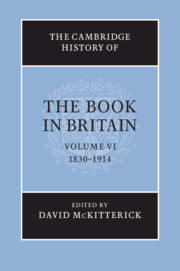Book contents
- Frontmatter
- Introduction
- 1 Changes in the look of the book
- 2 The illustration revolution
- 3 The serial revolution
- 4 Authorship
- 5 Copyright
- 6 Distribution
- 7 Reading
- 8 Mass markets: religion
- 9 Mass markets: education
- 10 Mass markets: children’s books
- 11 Mass markets: literature
- 12 Science, technology and mathematics
- 13 Publishing for leisure
- 14 Publishing for trades and professions
- 15 Organising knowledge in print
- 16 The information revolution
- 17 A place in the world
- 18 Second-hand and old books
- 19 A year of publishing: 1891
- 20 Following up The reading nation
- Bibliography
- Index
- Plate Sections
- References
6 - Distribution
Published online by Cambridge University Press: 28 March 2010
- Frontmatter
- Introduction
- 1 Changes in the look of the book
- 2 The illustration revolution
- 3 The serial revolution
- 4 Authorship
- 5 Copyright
- 6 Distribution
- 7 Reading
- 8 Mass markets: religion
- 9 Mass markets: education
- 10 Mass markets: children’s books
- 11 Mass markets: literature
- 12 Science, technology and mathematics
- 13 Publishing for leisure
- 14 Publishing for trades and professions
- 15 Organising knowledge in print
- 16 The information revolution
- 17 A place in the world
- 18 Second-hand and old books
- 19 A year of publishing: 1891
- 20 Following up The reading nation
- Bibliography
- Index
- Plate Sections
- References
Summary
‘The wagon, the canal barge, the merchant vessel, the post office and the railroad may have influenced the history of literature more than one would suspect.’ This chapter looks at the ways in which books, newspapers and periodicals reached the reader during the period 1830–1914. As one member of the book trade noted, by ‘making communication and carriage far cheaper and more rapid’ changes in ‘our railway and post-office systems’ were having a profound effect upon the ways in which books were published, distributed and sold during the 1850s. The development of the railway system, which was serving most of the great cities by the 1840s, was very important to the enlargement of the market for print and I look in some detail at those major wholesalers such as W. H. Smith & Son and John Menzies who exploited its potential both as a mode of distribution and as a venue for the sale of texts in the form of railway bookstalls. Several of the journalists who visited Smith’s warehouse in the Strand during the 1860s and 1870s compared it to a factory. This metaphor seems apt for a period in which texts began to be produced on an industrial scale, but this chapter is also concerned with those other cultural middlemen, such as travelling salesmen, bookstall clerks, booksellers’ assistants and newsboys, whose hard labour helped to shape this new phase in the communication circuit just as much as the new technologies of print and communication.
Keywords
- Type
- Chapter
- Information
- The Cambridge History of the Book in Britain , pp. 238 - 280Publisher: Cambridge University PressPrint publication year: 2009
References
- 2
- Cited by

